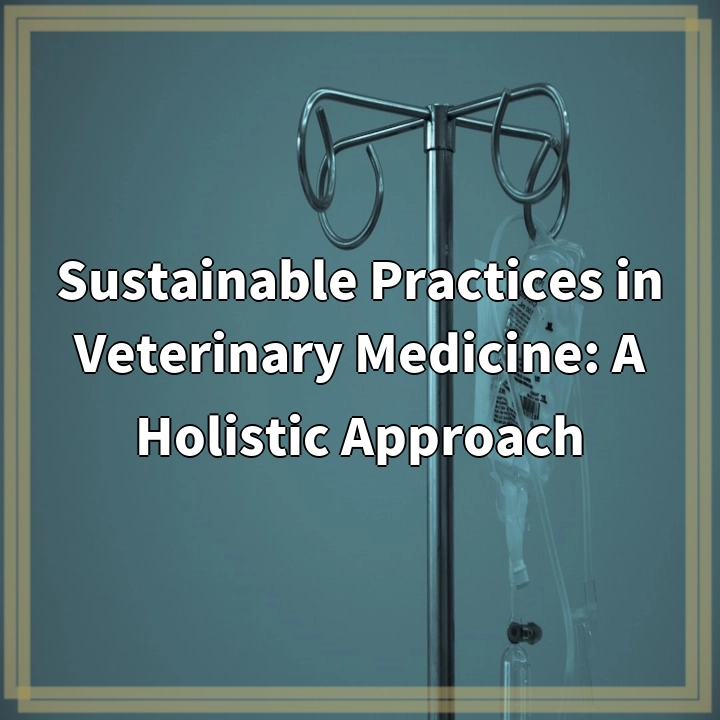Physical Address
304 North Cardinal St.
Dorchester Center, MA 02124
Physical Address
304 North Cardinal St.
Dorchester Center, MA 02124

Sustainable Practices in Veterinary Medicine refers to the adoption of environmentally-friendly and socially-responsible methods and techniques in delivering veterinary care. It involves considering the impact of veterinary practices on the environment, animal welfare, and public health, and implementing strategies to minimize negative consequences while maximizing positive outcomes. This approach aims to create a balance between providing effective medical treatment for animals and reducing the environmental footprint of veterinary clinics and hospitals.
1. Waste Management:
One of the major challenges in sustainable veterinary medicine is the proper management of waste generated in clinics, including hazardous materials, medical waste, and pharmaceutical waste. Improper disposal methods can lead to contamination of soil and water systems.
2. Energy Consumption:
Veterinary clinics consume a significant amount of energy for lighting, heating, cooling, and medical equipment. The excessive use of electricity contributes to greenhouse gas emissions and increases the carbon footprint of these establishments.
3. Medication Disposal:
The improper disposal of expired or unused medications can have detrimental effects on the environment and wildlife populations. The presence of pharmaceuticals in water systems can lead to long-term ecological damage.
4. Single-Use Items:
The use of single-use items such as gloves, syringes, and packaging materials in veterinary practices produces a large amount of plastic waste. Finding sustainable alternatives and implementing recycling programs can help address this issue.
5. Chemical Use:
Veterinary treatments often involve the use of chemicals, such as disinfectants and pesticides, which can have negative impacts on the environment, including water pollution and harm to non-target organisms.
6. Antibiotic Resistance:
The overuse and misuse of antibiotics in veterinary medicine contribute to the development of antibiotic-resistant bacteria, posing a significant threat to both animal and human health.
7. Sustainable Sourcing:
Ensuring that the products and medications used in veterinary practices are sustainably sourced, cruelty-free, and ethically produced can be a challenge. The lack of transparency in supply chains and limited availability of sustainable options can make it difficult for veterinarians to adhere to these principles.
By addressing these real-world problems and adopting sustainable practices, veterinary professionals can contribute to a more environmentally conscious and socially responsible approach to animal healthcare.
There are several solutions for addressing the real-world problems associated with sustainable practices in veterinary medicine. By implementing these strategies, veterinary professionals can contribute to a more sustainable and environmentally-friendly approach to animal healthcare.
1. Waste Management:
– Implement proper waste management protocols, including separate collection and disposal of hazardous and medical waste.
– Explore recycling and reusing options for materials wherever possible.
– Educate staff on proper waste disposal practices to minimize environmental impact.
2. Energy Conservation:
– Switch to energy-efficient lighting systems and equipment.
– Install timers or sensors to control energy usage.
– Optimize heating and cooling systems for efficient energy consumption.
– Use renewable energy sources, such as solar panels, where feasible.
3. Medication Disposal:
– Educate clients about proper medication disposal methods.
– Establish take-back programs for unused or expired medications.
– Work with local authorities and pharmacies to ensure safe and environmentally-friendly disposal options.
4. Reduction of Single-Use Items:
– Identify sustainable alternatives to single-use items and implement their use in veterinary practices.
– Encourage the use of durable and reusable equipment and supplies whenever possible.
– Establish recycling programs for plastic waste generated in the clinic.
5. Responsible Chemical Use:
– Choose eco-friendly and biodegradable cleaning agents and disinfectants.
– Minimize the use of pesticides and opt for non-toxic alternatives.
– Follow best practices for handling and disposal of chemical substances to prevent water pollution.
6. Antibiotic Stewardship:
– Develop and follow guidelines for responsible antibiotic use in veterinary medicine.
– Practice diagnostic testing to accurately determine the need for antibiotics.
– Educate clients on the importance of completing antibiotic courses as prescribed.
7. Sustainable Sourcing:
– Prioritize sourcing from environmentally-conscious and ethically-responsible suppliers.
– Seek certifications and labels that guarantee sustainable and cruelty-free products.
– Advocate for transparency in supply chains and support local, sustainable businesses when possible.
By implementing these solutions, veterinary professionals can contribute to a more sustainable future for animal healthcare.
If you’re wondering where the article came from!
#